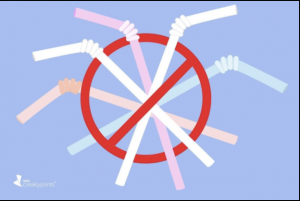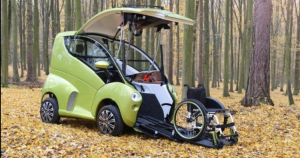Eco-Ableism in the Zero Waste Movement
By: Alexandra Aladham, First Year at Oxford College, Environmental Sciences Major
Since the early 2000’s, the world has seen a push toward zero waste lifestyles and policies in an effort to curb irresponsible production, waste, and consumption. The Zero Waste Movement has aligned itself with these efforts, aiming to conserve resources and combat systems that harm the environment and overall human health. However, the movement’s attempt to alleviate the problems caused by wasteful practices has given way to an often overlooked issue—eco-ableism.
Eco-ableism can be defined as a form of discrimination toward individuals with disabilities through an ecological and environmental lens (Wolbring et al., 2017). Like many forms of ableism, it has resulted from a lack of diverse voices within the movement. Although many environmentalists and zero waste lifestyle followers only intend to better the world through their actions and beliefs, some overlook the importance of varied perspectives and mindsets. In order to fully understand how eco-ableism is embedded in the movement, let’s look at some current, real-life examples.

In an attempt to comply with the ever-growing acceptance of a zero waste lifestyle, many businesses and governments have instituted bans on single-use plastics. During July 2018, Seattle issued a city-wide ban on all plastic utensils and straws (CBS News, 2018). This entailed that any business, such as bars, restaurants, or cafes, residing in the city must cease from using these single-use items. As a result, many of these locations have become inaccessible to disabled individuals that require bendable, plastic, single-use straws, spoons, and forks to consume their food.

Another example of how eco-ableism has found its way into the Zero Waste Movement can be seen with transportation. For individuals without physical disabilities, one great way to produce little to no waste while traveling would be by walking, riding a bike, or taking public transportation, instead of owning an individual car. However, these transportation options are not accessible to some people with physical disabilities. Instead, driving or using a car fit for specific physical disabilities remains one of the most efficient and beneficial forms of transportation. Cars, such as The Elbee, are designed for people who use wheelchairs. Due to its front-loading option, individuals are able to enter, drive, and exit the car on their own, which not only saves time, but also gives the driver more freedom (The Irish Times, 2017). Even though many of these cars produce waste in the form of CO₂, they better the lives and health of thousands.
These instances pose the question: what ways can the world decrease waste, while accommodating everyone? The answer lies in what we view as “essential” and what we view as “non-essential.” Many see single-use plastics as non-essential because we can use reusables or compostable options. However, some individuals have physical disabilities that require specific straws or utensils. Reusable metal straws that do not bend or compostable ones that do not remain dry are not feasible. With this, cars are often considered non-essential as well, especially in big, metropolitan cities, because people may have short commutes or access to public transportation. Yet, they can be vital to those that cannot properly use buses or trains without outside help. All in all, when evaluating zero waste policies, programs, and lifestyles, individuals must aim to eliminate non-essential and excessive waste only.
Within the movement, zero waste leaders and lifestyle followers must learn to diversify the narrative surrounding the environment and waste. This means listening to the voices of individuals with disabilities and incorporating ideas and designs that benefit all humans. As with many progressive movements, responsibility tends to fall onto the individual, expecting too much from the general public. Instead of allowing this burden to fall on individuals with disabilities, the Zero Waste Movement must identify and hold responsible the true cause of overproduction, consumption and waste. Only then can the movement make real progress toward a world with zero non-essential waste. Overall, when it comes to environmental justice, persons with disabilities must be welcomed and included in the conversation in order for real change to occur (Bretz, 2020).
Bibliography
Bretz, Thomas H. “Discussing Harm without Harming: Disability and Environmental Justice.” Environmental Ethics, vol. 42, no. 2, 2020, pp. 169-187. PhilPapers. Accessed 18 March 2021.
CBS News. “Seattle becomes first U.S. city to ban plastic utensils and straws.” CBS News, CBS, 2 July 2018, https://www.cbsnews.com/news/seattle-becomes-first-u-s-city-to-ban-plastic-utensils-and-straws/. Accessed 18 March 2021.
CreakyJoints. “Plastic Straw Bans Are Not Fair to People with Disabilities, and Here’s What We Can Do About It.” CreakyJoints, 28 October 2019, https://creakyjoints.org/advocacy/plastic-straw-bans-bad-for-people-with-disabilities/. Accessed 18 March 2021.
The Irish Times. “‘It changed my life’: the front-loading car for disabled drivers.” The Irish Times, 24 June 2017, https://www.irishtimes.com/news/ireland/irish-news/it-changed-my-life-the-front-loading-car-for-disabled-drivers-1.3129402. Accessed 18 March 2021.
Wolbring, Gregor, and Aryn Lisitza. “Justice Among Humans, Animals, and the Environment.” The Intersectionality of Critical Animal, Disability, and Environmental Studies, Lexington Books, 2017, pp. 41-62.


Or even better, to realize that what *constitues* “essential” and “non essential” items should be understood as, itself, variable from individual to individual, and likewise so too the expectations. The archetypal plastic straw is indeed non-essential for those suitably abled, but it may be essential in certain kinds of disabilities, and thus two persons differing in this regard should be held to two different standards. “Equality” is not the same as justice. At best, it is only a very naive starting point.